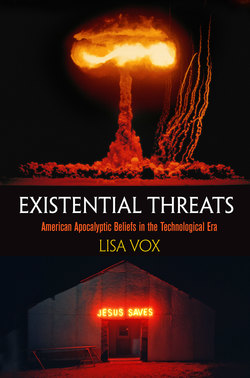Existential Threats

Реклама. ООО «ЛитРес», ИНН: 7719571260.
Оглавление
Lisa Vox. Existential Threats
Отрывок из книги
EXISTENTIAL THREATS
AMERICAN APOCALYPTIC BELIEFS IN THE TECHNOLOGICAL ERA
.....
Brendan M. Pietsch’s recent Dispensational Modernism (2015) separates the history of dispensationalism from premillennialism, locating the roots of the former in the “popular fascination with applying technological methods—such as quantification and classification—to the interpretation of texts and time.”66 Downplaying the role of Darby, Pietsch argues that dispensationalism grew out of the desire to develop a scientific understanding of the Bible that respected the Bible as an infallible, God-inspired text. He makes too much of the separation between dispensationalism from premillennialism, especially by the turn of the twentieth century; dispensationalism was at its core another way to conduct Bible prophecy. Nevertheless, Pietsch helps explain why this particular interpretation found a home so readily in the United States. Using classification and categorization methods akin to those in engineering and biological sciences, dispensationalists appealed to the creed that an individual could uncover new meaning within the Bible as well as to the American love affair with things new and technological after the Civil War.
The heyday of science as an infallible authority began in the late nineteenth century. As Britons and Americans conducted debates over the origins of humans and the age of the Earth, they drew boundaries between what they considered to be science and religion. Darwin, Huxley, and John Tyndall, an Irish physicist, worked to include only naturalistic descriptions of the world within the realm of science, and increasingly this became the standard way to depict science as opposed to religion in Britain and the United States.67 The professionalization of science led to its elaboration as a body of knowledge that experts build through deductive reasoning and experimentation.68 Societal progress was no longer a moral goal but associated with the increase of knowledge aimed at material improvement.69 Science itself represented progress over religion, while prescientific ages and cultures as so conceived were deemed inferior. The “scientific method” promised to uncover the solutions to all of society’s current and future problems.70
.....